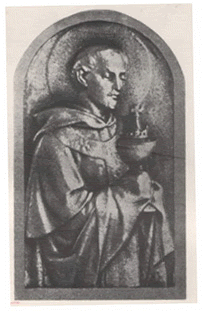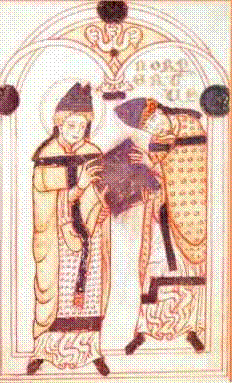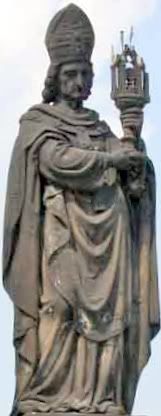Today, June 6, we commemorate the feast day of Saint Norbert of Xantan (1080-1134), a worldly noble converted much like Saint Paul, who became a zealous preacher and bishop. The life of Saint Norbert reminds us that it is never too late to repent, turn our broken selves to the Lord, and become whole in His ministry.
Norbert was born in Xantan (now Germany), and grew up in the royal court of Emperor Henry V. Norbert took the robes of a secular monastic order(refusing the priesthood, due to the restrictions it would place on his lifestyle), serving as the court’s chief alms gatherer. However, he embraced his position not out of obedience and love for the Lord, but rather as a career move and occupation which allowed him access to the emperor. He, like most of the court, was governed by the principles of pleasure, and thought little of the implications of his lifestyle on his soul.
One afternoon, when Norbert was approximately 35, he was out riding across the countryside for sport when a powerful thunderstorm arose without warning. A lightning bolt opened up the ground before him, causing his horse to toss him to the ground, rendering him unconscious. He lay in the heavy rain, on the ground, soiling his fancy clothes and well-coifed hair for hours, neither the rain nor the thunder reviving him. When he awoke, Norbert gazed at the stormy sky and asked, "Lord, what do you want me to do?" (the same words Saint Paul spoke on the road to Damascus.) In response to his question, Norbert heard, "Turn from evil and do good. Seek peace and pursue it."
From that moment on, Norbert converted his life, and bore witness to those around him of the power of the Lord. He returned home, and committed himself to studying for the priesthood, a vocation he had previously avoided. He spent his days in prayer, fasting, and mortification—reparation for his lifetime of sinfulness. Labeled a hypocrite by many, Norbert gave away all of his worldly possessions to the poor, and for the remainder of his life, strove to own nothing. He traveled to Rome, seeking an audience with the pope, begging permission to preach.
The pope gladly commissioned Saint Norbert, who traveled throughout Europe, preaching to all who would listen. On the day of his ordination, Norbert said: "O Priest! You are not yourself because you are God. You are not of yourself because you are the servant and minister of Christ. You are not your own because you are the spouse of the Church. You are not yourself because you are the mediator between God and man. You are not from yourself because you are nothing. What then are you? Nothing and everything. O Priest! Take care lest what was said to Christ on the cross be said to you: 'He saved others, himself he cannot save!'"
During his travels, Norbert—in penance for his sins—chose the most difficult paths and roads to take, walking barefoot, even during the harsh European winters. Those who traveled with him oftentimes died from exposure to the elements, and while Norbert himself suffered, he maintained his health. Over time, he regained the respect of those who had labeled him hypocrite, and they, in turn, looked to him for guidance, preaching, and reform.
During his travels, Saint Norbert preached a return to the truth of the Gospel, which had been lost in some communities. For example, he once said to the people of Antwerp, “Brothers, do not be surprised and do not be afraid. Unwittingly you have pursued falsehood thinking it to be the truth. If you had been taught the truth first you would have been found effortlessly tending toward salvation, just as you now effortlessly lean toward perdition.” Also wholly devoted to the Holy Eucharist, Saint Norbert tirelessly defended the sanctity of the Blessed Sacrament. He is credited for driving a heretic (Tanchelin) from Antwerp who repeatedly renounced the reality of the priesthood and blasphemed the Blessed Sacrament, removing it from the cathedral and hiding it. Saint Norbert, led by the Holy Spirit, rescued the monstrance, returning it unharmed to the cathedral, rekindling the people’s love and adoration of the Eucharist.
Norbert had garnered a reputation for orthodoxy, strict adherence to Church guidelines (not always the case at that time), and strict observance of the Dominican Rule. His model and life attracted many followers, and following a gift of land, Norbert began a small monastic community. This Augustinian community, eventually known as Norbertines (or Premonstratensians) grew to eight monasteries and two convents, and the order eventually swept through Europe, bringing with it a return to orthodoxy and reform.
From the Life of Saint Norbert: “Norbert established a clergy dedicated to the ideals of the Gospel and the apostolic Church. They were chaste and poor. They wore the clothing and the symbols of the new man; that is to say, they wore “the religious habit and exhibited the dignity proper to the priesthood.” Norbert asked them “to live according to the norms of the Scriptures with Christ as their model. The priests lived in community, where they continued the work of the apostles. When Norbert was appointed as archbishop, he urged his brothers to carry the faith to the lands of the Wends. Faith was the outstanding virtue of Norbert’s life, as charity had been the hallmark of Bernard of Clairvaux. Affable and charming, amiable to one and all, he was at ease in the company of the humble and the great alike. Finally, he was a most eloquent preacher; after long meditation he would preach the word of God and with his fiery eloquence purged vices, refined virtues and filled souls of good will with the warmth of wisdom.”
Norbert was eventually selected as bishop (and later archbishop) of Madgebourg. Legend tells us that upon arrival to his new bishop’s residence, the porter refused to let Norbert inside, believing him to be a beggar. The crowd who had accompanied the new bishop reprimanded the porter, but Norbert, such was his humility, gently told him, "You were right the first time."
Upon Saint Norbert’s death, his remains were interred at Madgebourg, but many centuries later, moved to a Norbertine abbey of Stahov in Prague. At that time, his body was found to be incorrupt.
In cloistered hearts thou didst awake
The love of Him, Who for our sake
Dwells on our altars, closely veiled.
When Tanchelin’s profane touch assailed
That sacred Mystery, thou didst raise
Thy trumpet voice. And with amaze
The Gallic nation stood to hear
Thy matchless accents, rich and clear;
St. Bernard, too, proclaiming thee
A lute of heavenly melody.
Angels of peace, at thy command
Fierce discord vanished from the land,
And hearts by thee to Jesus given
Brought forth abundant fruit for Heaven.
When comes, at last, the harvest hour,
Oh! garner us, with saintly power.
Saint Norbert followed the rules of Saint Augustine, who undertook Church reform centuries earlier. His works led to true conversion of others, following the miraculous Godly conversion of himself. His life reminds us each to strive for our own true conversion, deep within ourselves, every day… remembering that it is never too late to turn to the Lord! In the words of Saint Augustine:
O God, Framer of the universe, grant me first rightly to invoke Thee; then to show myself worthy to be heard by Thee; lastly, deign to set me free. God, through whom all things which of themselves were not, tend to be. God, who out of nothing hast created this world, which the eyes of all perceive to be most beautiful. God, the Father of truth, the Father of wisdom, the Father of the true and crowning life, the Father of blessedness, the Father of that which is good and fair, the Father of intelligible light, the Father of our awakening and illumination, the Father of the pledge by which we are admonished to return to Thee.
God, from whom to be turned away, is to fall: to whom to be turned back, is to rise again: in whom to abide, is to stand firm. God, from whom to go forth, is to die: to whom to return, is to revive: in whom to have our dwelling, is to live. God, whom no one loses, unless deceived: whom no one seeks, unless stirred up: whom no one finds, unless made pure. God, by whom we distinguish good from ill. God, by whom we flee evil, and follow good. God, who leadest us to the door of life. God, who causest it to be opened to them that knock. God, who givest us the bread of life. God, who cleansest us, and preparest us for Divine rewards, come graciously to me.
Thou the only God, come unto my help. God, whom all things serve, that serve, to whom is compliant every virtuous soul. By whose laws the poles revolve, the stars fulfill their courses, the sun enlivens the day, the moon tempers the night: and all the framework of things, day after day by turns of light and gloom, month after month by waxings and wanings of the moon, year after year by unceasing order of spring and summer and fall and winter, and through the mighty orbs of time, folding and refolding upon themselves, as the stars still recur to their first conjunctions, maintains, so far as mere visible matter allows, the mighty constancy of things. God, by whose laws the choice of the soul is free, and to the good rewards and to the evil pains are distributed by necessities settled throughout all natures. Who hast made man after Thine image and likeness, as he who has come to know himself discovers. Hear me, hear me, graciously hear me, my God, my Lord, my King, my Father, my Cause, my Hope, my Wealth, my Honor, my House, my Country, my Health, my Light, my Life. Hear, hear, hear me graciously, in that way, all Thine own, which though known to few is to those few known so well.
Henceforth Thee alone do I love, Thee alone I follow, Thee alone I seek, Thee alone am I prepared to serve, for Thou alone art rightly Lord, and of Thy lordship I desire to be. Direct, I pray, and command whatever Thou wilt, but heal and open my ears, that I may hear Thine utterances. Heal and open my eyes, that I may behold the signs of thy command. Drive delusion from me, that I may recognize Thee. O Lord, most merciful Father receive, I pray, Thy fugitive; enough already, surely, have I been punished, long enough have I served Thine enemies, whom Thou hast under Thy feet, long enough has error had its way with me. To Thee I feel I must return: I knock; may Thy door be opened to me; teach me the way to Thee.
Year 2: Day 157 of 365
Prayer Intentions: Hearts of Conversion; For leaders of the Church.
Requested Intentions: Successful employment for couple (K); For employment for children (K); For health of friend, for successful relationships for children, for safe pregnancy for daughter (C); For the health of a mother (J); Virtue for daughter (V); Successful acceptance to college for nephew (M); For the health of a cousin (T); Freedom from legal difficulties for husband (S); Husband’s freedom from illness (L); Personal intentions (S); Successful passing of dental board examination (P); Blessings on a family (Z); Successful permanent employment (C); Healing of a son with autism (J); Son’s successful employment (L); For the intentions of family and relatives, for the Carthusian community (T); For personal intentions (A); Restoration of lost hearing (C); Resolution of relational and financial challenges (S); Comfort following loss of husband, security for family, assistance with housing (B); Healing and return of brother (O); Successful hermitage foundation (S); Support from family, permission to marry (H); Recovery of wife following surgery, freedom from depression (W); Protection and recovery of mentally ill daughter (J); Successful resolution to legal proceedings (N); Freedom from worry and successful employment (M); For successful sale of home and freedom from debt (J); Freedom from pain and illness (E).














No comments:
Post a Comment
Thanks for leaving a comment. If you wish to submit a prayer request, however, please do so above, using the "Contact" tab.